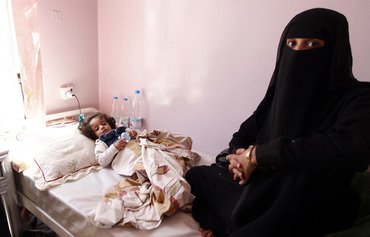Medical officials in Yemen are expressing concern over the multiplying number of scabies infections in internally displaced people (IDP) camps across the country.
Yemeni Ministry of Public Health and Population officials said as of June more than 2,500 cases have been recorded in Amran, Saada, Hodeidah and Hajjah provinces.
Doctors Without Borders (MSF) said in a June 19th statement that the number of cases of scabies in Amran province in northern Yemen rose to 1,927 in May due to the hardship residents are experiencing as a result of the ongoing conflict.
The organisation said the number of cases it treated in the province rose steadily over the past few months: 123 in January, 131 in February, 254 in March, 576 in April and 1,927 in May.
MSF said it is conducting an "awareness campaign through its mobile health clinics and treating all cases that come to those mobile clinics", particularly in the Khamr directorate.
Spreading beyond the camps
The skin condition spread from one IDP camp to another in Amran province "and there is concern of it spreading among [the general] population," said Mohamed Harmal, executive director of the Sanaa-based Executive Unit for IDPs.
As a result, residents of Amran are banned from entering the camp to give the IDPs food and health aid out of fear the condition will spread to general population.
Harmal said the Global Protection Cluster, a group of government agencies and organizations that work to support IDPs, tried "to move the marginalized IDPs camps from Amran to the directorate of Harf Sufyan to quarantine them and thus facilitate the entry of food and health aid" but local residents there refused to admit them for fear of further spread of the condition.
He said scabies has also spread in the provinces of Saada and Shabwa, "and we sent them assistance tents to contribute to the treatment of people infected with the disease".
Harmal said scabies initially spread in Saada province among residents who carried it with them when they were displaced to other areas due to the war.
Preventive measures
"The number of infections could increase because scabies is a contagious disease if preventive health measures are not taken and patients are not quarantined and all their equipment are sterilized and burned," Yemeni Ministry of Public Health and Population spokesman Dr. Tamim al-Shami told Al-Shorfa.
"The Ministry of Health is bearing the major portion of the burden due to lack of financial means in addition to the shortage of drugs and equipment because of the war," he said.
Abdul Hakim al-Kahlani, director of epidemiology at Yemen's Ministry of Health and Population, said the prevention of the disease is linked to personal hygiene, and washing mattresses and bed covers and exposing them to the sun.
"The ministry, in collaboration with World Health Organisation, UNICEF [United Nations Children's Emergency Fund], MSF, and the international aid organization CARE, is responding to the needs of infected citizens through the implementation of measures, including dispatching medical and epidemiological teams to conduct surveys, monitoring cases, verifying symptoms and then treating cases on an individual basis," al-Kahlani told Al-Shorfa.
He said the WHO and MSF are providing the necessary medicine since the ministry "is suffering from scarcity of medicine, capabilities and money to cover operating expenses due to the prevailing circumstances of war in the country".
Al-Kahlani said they were also working with numerous organisations on "educating IDPs and school children about the disease, how it is transmitted, ways to prevent it, and focusing attention on personal hygiene".

![Mobile health clinics from Yemeni Ministry of Public Health conduct examinations on internally displaced people in a camp in Amran province. [Photo courtesy of Yemeni Ministry of Public Health]](/cnmi_am/images/2016/07/14/5886-scabies-_yemen-600_384.jpg)






